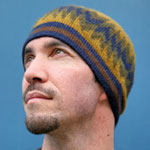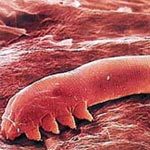For the past six or seven years, I’ve been getting folliculitis on the back of my scalp only during the winter. My new dermatologist claims that I have ‘sterile folliculitis.” Apparently, when I get haircuts, the hairs regrow skew and my immune system attacks them as if they were foreign. I have two questions 1) why does this only happen in the winter and 2) why is there a time lag between the emergence of the hair from my skin and the onset of inflammation (my hair is already 1-2 inches long when pus starts to form around the follicle…I would expect the pus to form just as it was emerging, not a couple of inches later). Thanks for your help.
P.S. I’m a medical student and would love technical details about the inflammatory response against my hair because I find the whole thing sort of mystifying, assuming the diagnosis is correct.
A good friend of mine has the same problem that you mentioned whenever he gets a haircut, and I have a similar problem around the winter months (when I am in colder weather).
As a medical student you should know that this is the “practice” of medicine… and not the “science” of medicine. There is no solid scientific explanation, but doctors are keen to ‘describe’ what they see and give it fancy names (sterile folliculitis sounds good, and I am supposed to be an expert in the field).
My personal theory is that in the winter months, your skin is more dry; dry skin promotes irritation to the skin. I suspect your neck/back of scalp is more sensitive to dry skin.
With respect to haircuts and folliculitis, I suspect that the short haircuts irritate your skin (the same way dry air/weather does).
You must remember it is not all about the diagnosis, but what you do with it and how you treat it. We can all try to be intellectual and talk about the immune system and the mediators such as IL2, IL4, TGF, B cells, T cells, etc, etc (immunology), but in the end it seems cold weather and short haircuts just don’t agree with you. Avoid short haircuts and try moisturizing cream.
Tags: folliculitis, haircut, irritation, inflammation, immunology, immune

 As a surgical specialty, hair restoration has got to have the greatest patient satisfaction of any (at least in my opinion). It is supreme for helping people solve a problem that bothers them. Some people are quick to say that “it’s just hair” or look at hair transplants as strictly a vanity issue — and while those people are certainly entitled to their opinions, I would disagree with this notion. Hair loss can be a nightmare for many, and the injury to one’s confidence can be substantial. As I’ve said before, hair can be as important to men as the lion’s mane is to the lion. It is what creates his majestic look.
As a surgical specialty, hair restoration has got to have the greatest patient satisfaction of any (at least in my opinion). It is supreme for helping people solve a problem that bothers them. Some people are quick to say that “it’s just hair” or look at hair transplants as strictly a vanity issue — and while those people are certainly entitled to their opinions, I would disagree with this notion. Hair loss can be a nightmare for many, and the injury to one’s confidence can be substantial. As I’ve said before, hair can be as important to men as the lion’s mane is to the lion. It is what creates his majestic look. I am aware that stem cells can grow organs. Hair is an organ so if you can grow a heart, then one should be able to grow hair from stem cells. There are clinical trials presently underway that show stem cell placed in the heart, will grow heart cells.
I am aware that stem cells can grow organs. Hair is an organ so if you can grow a heart, then one should be able to grow hair from stem cells. There are clinical trials presently underway that show stem cell placed in the heart, will grow heart cells.  I have never seen his hairline because he always combs it forward and over to cover it. I do believe that he had the old type of transplant and scalp reduction procedure, leaving him with enough of a deformity that he needs to cover his hair with his unique style of combover. I would love to see him and give him an opinion on how to fix it. I would, of course, respect his privacy and keep his medical care completely confidential, just as I would with the truck drivers who came to see me.
I have never seen his hairline because he always combs it forward and over to cover it. I do believe that he had the old type of transplant and scalp reduction procedure, leaving him with enough of a deformity that he needs to cover his hair with his unique style of combover. I would love to see him and give him an opinion on how to fix it. I would, of course, respect his privacy and keep his medical care completely confidential, just as I would with the truck drivers who came to see me. According to
According to  Many of the Jewish faith wear yarmulkes, and the Pope wears a zucchetto (both are skullcaps), and they keep it on most of the time. These are loose fitting and non-constricting. If your beanie is tight, then maybe it is putting pressure on the peripheral nerves and causing your problem. I do not believe that there is any connection to the fabric, because you have used caps with different fabrics and still experience the same reaction. I don’t really have an answer for you, unfortunately, except for the too tight explanation, but you know how tight it is on your head. Covering part or all of the head is essentially the same, whether with a skullcap, beanie, or even a baseball cap.
Many of the Jewish faith wear yarmulkes, and the Pope wears a zucchetto (both are skullcaps), and they keep it on most of the time. These are loose fitting and non-constricting. If your beanie is tight, then maybe it is putting pressure on the peripheral nerves and causing your problem. I do not believe that there is any connection to the fabric, because you have used caps with different fabrics and still experience the same reaction. I don’t really have an answer for you, unfortunately, except for the too tight explanation, but you know how tight it is on your head. Covering part or all of the head is essentially the same, whether with a skullcap, beanie, or even a baseball cap. I received quite a few emails today from readers of Balding Blog that saw me on the new
I received quite a few emails today from readers of Balding Blog that saw me on the new 


 Demodex folliculorum is a tiny mite, less than 0.4 mm long, that lives in pores and hair follicles. It is usually seen on the nose, forehead, cheek, and chin, and often in the roots of your eyelashes. Demodicids look like worms. People with oily skin, or those who use cosmetics heavily and don’t wash thoroughly have the heaviest infestations, but it is not uncommon for adults to carry a few demodicids.
Demodex folliculorum is a tiny mite, less than 0.4 mm long, that lives in pores and hair follicles. It is usually seen on the nose, forehead, cheek, and chin, and often in the roots of your eyelashes. Demodicids look like worms. People with oily skin, or those who use cosmetics heavily and don’t wash thoroughly have the heaviest infestations, but it is not uncommon for adults to carry a few demodicids.